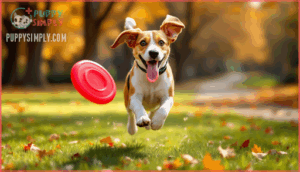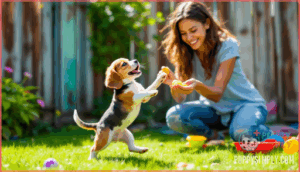This site is supported by our readers. We may earn a commission, at no cost to you, if you purchase through links.

Beagles aren’t just another small breed—they’re descendants of English hunting hounds with instincts so powerful that your neighbor’s barbecue three houses down becomes an irresistible investigation mission. These compact scent hounds pack centuries of breeding into a 20-24 pound frame, which means you’re getting both the unwavering loyalty of a pack animal and the occasional stubbornness of a dog who’s absolutely certain that mysterious smell is more important than your recall command.
Before you fall for those floppy ears, you’ll want to know exactly what living with a Beagle really looks like—from the financial commitment through their 12-15 year lifespan to the daily reality of managing their energy, vocal tendencies, and affectionate nature.
Table Of Contents
- Key Takeaways
- Beagle History and Origins
- Beagle Size and Appearance
- Beagle Temperament and Personality
- Are Beagles Good Family Dogs?
- Beagle Exercise Needs
- Training and Handling Beagles
- Beagle Health Issues
- Beagle Lifespan and Longevity
- Beagle Ownership Costs
- Finding a Beagle Breeder or Rescue
- Frequently Asked Questions (FAQs)
- How long do Beagles live?
- Are Beagles good family pets?
- Can Beagles shorten their lifespan?
- How much is a beagle worth?
- Do Beagles outlive males?
- Is a beagle a healthy breed?
- What are the grooming needs for beagles?
- How much do beagles bark and how can you control it?
- Are beagles good with cats or other small pets?
- What kind of toys and activities do beagles enjoy?
- Conclusion
Key Takeaways
- Beagles require a significant financial commitment of $1,700-$3,900 annually and live 12-15 years, with costs covering veterinary care, quality nutrition, insurance, and supplies that extend well beyond the initial $50-1,500 purchase or adoption price.
- Their hunting heritage creates a powerful scent drive and vocal nature (barking, howling, baying) that demands consistent training, 60-90 minutes of daily exercise, and realistic expectations about their independent, sometimes stubborn personality.
- While Beagles make excellent family dogs due to their friendly, affectionate temperament and patience with children, they’re prone to breed-specific health issues including ear infections (7% annually), hip dysplasia (18%), epilepsy (1.4%), and obesity that requires proactive veterinary management.
- Success with Beagles depends on understanding they’re pack hounds bred for communication and tracking, meaning you’ll need patience for training challenges, tolerance for their vocal expressions, and commitment to preventing boredom-related behavioral problems through mental stimulation and physical activity.
Beagle History and Origins
If you’ve ever wondered where those floppy-eared, nose-to-the-ground pups came from, beagles have been sniffing out game across the English countryside for hundreds of years. Their ancient roots trace back to Roman hounds and Medieval pack hounds, bred specifically for their outstanding scent-tracking abilities. English origins shaped the beagle breed we recognize today, with hunters on foot relying on these determined dogs during fox hunting expeditions and rabbit pursuits.
The breed development gained momentum in the 1830s when standardized breeding practices emerged, though accounts suggest beagles existed long before. Queen Elizabeth I famously kept pocket beagles as hunting companions.
Today’s beagle temperament and personality reflect this hunting heritage—you’ll notice traces of that persistence and energy in every beagle breed member, even when they’re curled up on your couch instead of tracking scents through the woods.
Beagle Size and Appearance
Beagles pack a lot of personality into a compact, sturdy frame that’s built for both following a scent trail and curling up on your lap afterward. Males usually stand 14.5-16 inches tall and weigh around 22-24 pounds, while females share the same height but tip the scales slightly lighter at 20-22 pounds.
Their short, dense coat comes in classic combinations like tri-color, red and white, lemon, and even badger pied—all weather-resistant and surprisingly low-maintenance.
You’ll recognize a beagle’s characteristic look immediately: those soulful brown eyes, soft floppy ears that frame their face, and a moderately long tail carried high with confidence. Their nose, perfectly designed for tracking, sits at the center of a gently domed skull, giving them that alert, inquisitive expression that beagle owners know so well.
Beagle Temperament and Personality
If you’re wondering whether a Beagle’s personality will fit your lifestyle, understanding their core temperament traits is essential.
These dogs have distinct characteristics that shape how they interact with families and their environment. Let’s look at three defining aspects of the Beagle personality.
Friendly
There’s a reason Beagles consistently rank among the most beloved family companions—their warm, welcoming spirit makes just about everyone feel like their best friend. Their Beagle temperament naturally draws people in, creating social bonds that strengthen family dynamics daily. You’ll notice these affection levels through:
- Tail-wagging greetings that make every homecoming feel like a celebration
- Gentle nuzzles offering emotional support during tough moments
- Patient tolerance with children exploring dog conduct
- Enthusiastic acceptance of canine companions and new faces alike
These Beagle characteristics don’t just make training easier—they transform your home into a hub where everyone, from toddlers to grandparents, feels genuinely loved.
Playful
That friendly warmth you’ve already fallen for transforms into boundless energy the moment you toss a ball or pull out their favorite squeaky toy. Their playful nature means you’ll find them chasing anything that moves—whether it’s a tennis ball or a child’s giggles echoing through the yard.
These interactive games aren’t just fun activities; they’re essential outlets for those high energy levels that define Beagle characteristics. Plan for 30–60 minutes daily of fetch, tug-of-war, or puzzle toys to keep their playful demeanor balanced and your furniture intact.
Vocal
If you’ve ever wondered why your neighbor’s dog sounds like it’s announcing the mail truck three blocks away, chances are you’re hearing a Beagle’s signature song. These pack hounds were bred to communicate during hunts, so barking habits and baying come hardwired into their DNA. You’ll hear everything from melodic howls to persistent barks when they’re excited, bored, or catching an interesting scent.
While this vocal training challenge won’t disappear overnight, you can reduce noise levels through consistent canine communication cues—reward quiet conduct, provide mental stimulation through puzzle toys, and address attention-seeking patterns early. Understanding Beagle temperament means accepting some vocalization as part of their charming, expressive nature.
Are Beagles Good Family Dogs?
When you’re looking for a dog that’ll blend seamlessly into family life, Beagles check nearly every box—from their gentle way with kids to their surprisingly adaptable nature in different living situations. Their friendly temperament fosters strong family bonding, while their patient demeanor enhances child safety during everyday interactions.
Here’s what makes them excel as family pets:
- Affectionate with children of all ages, tolerating enthusiastic play
- Compatible with other pets through proper socialization needs
- Adaptable to various household dynamics, whether apartments or larger homes
- Thrive in active family lifestyles with regular engagement
- Form deep relationships through consistent care and maintenance
Their vocal nature and strong-willed personality require patience during ownership, but with positive reinforcement and attention to conduct patterns, they become wonderfully loyal companions.
Beagle Exercise Needs
Your Beagle needs between 60 and 90 minutes of daily activity to channel that boundless hunting-bred energy into healthy outlets rather than destructive ones. Break this into morning and evening sessions—brisk daily walks combined with playtime activities like fetch or scent games work beautifully.
These exercise routines shouldn’t just target physical fitness; mental stimulation matters just as much for this intelligent breed. Consider tracking trails where your Beagle can follow scents, or hide-and-seek games that engage those natural hunting instincts.
Without adequate dog exercise, you’ll notice weight gain and behavioral issues like excessive barking or chewing. Proper Beagle exercise and weight management creates a calmer, healthier companion who’s content to relax alongside you after their activity needs are met.
Training and Handling Beagles
Training a Beagle takes patience and consistency, as their intelligence comes with a strong independent streak. These scent hounds can be wonderfully trainable when you understand what makes them tick, but they’ll also test your resolve.
Let’s look at the common challenges you’ll face and practical tips to help you succeed.
Challenges
Training a beagle can feel like negotiating with a clever but easily sidetracked detective—one who’d rather follow their nose than listen to your cues. Their legendary scent drive means squirrels, interesting smells, and stray food wrappers instantly trump your commands.
Training a beagle means negotiating with a clever detective whose nose overrides every command you give
You’ll encounter common training challenges including:
- Stubborn streaks that test your patience
- Excessive barking and howling during training sessions
- Difficulty maintaining focus for more than brief moments
Socialization needs require consistent effort, and behavioral problems like ignoring recalls can create care difficulties if not addressed early.
Tips
The secret to successful beagle training isn’t forcing obedience—it’s making good conduct more appealing than whatever their nose is telling them to investigate. Keep sessions under 10 minutes, use high-value treats (think chicken or cheese), and practice in low-distraction environments first. Consistency beats excellence every time.
| Training Strategy | Why It Works for Beagles |
|---|---|
| Short, frequent sessions | Maintains focus before their attention drifts to the next interesting scent |
| High-value food rewards | Competes with their powerful nose and food motivation |
| Early housebreaking routine | Prevents stubborn habits from taking root during puppyhood |
Start puppy-proofing and housebreaking early—beagle ownership demands patience, but these nutrition advice and safety precautions pay off. Proper beagle training directly impacts beagle health and lifespan by preventing behavioral issues. With smart beagle care and maintenance, you’ll build a foundation that makes living with this scent hound genuinely enjoyable.
Beagle Health Issues
Like many purebred dogs, Beagles carry certain genetic vulnerabilities that responsible owners should understand. Ear infections top the list—those adorable floppy ears trap moisture and debris, making Beagles one of the most affected breeds, with roughly 7% developing otitis externa annually. Allergies—both food and environmental—frequently trigger skin irritation and chronic ear problems.
Epilepsy affects about 1.4% of Beagles, usually appearing around age six, though medication can manage symptoms effectively. Hip dysplasia shows up in approximately 18% of the breed, often causing discomfort as your dog ages. Their legendary appetite makes obesity control critical, since extra weight worsens joint issues and opens the door to diabetes and heart disease. You’ll also want to watch for hypothyroidism and eye conditions.
Regular vet checkups, quality nutrition, and keeping your Beagle lean form your best defense. With attentive canine health management, most Beagles overcome these challenges and thrive. Understanding common health issues is key to providing the best care for your Beagle.
Beagle Lifespan and Longevity
Most Beagles enjoy a healthy 12 to 15 years with you, with the average falling around 13.5 years—some even reach their late teens under favorable conditions. Their classification as a small breed works in their favor, since larger dogs typically average only 8 to 12 years. Genetic factors play a huge role here; responsible breeding reduces hereditary diseases that threaten beagle life expectancy.
Several elements directly impact your dog’s health span and longevity risks:
- Quality nutrition and maintaining a lean body weight
- Regular veterinary care with early disease detection
- Indoor living with protection from harsh elements
- Spaying or neutering to prevent reproductive cancers
Around age 9 or 10, your Beagle enters senior care territory. Cancer becomes a primary concern in older Beagles, alongside neurological conditions. But with attentive preventative care, you’ll boost those quality years together. Understanding the aging process helps you adapt their routine—gentler exercise, joint supplements, more frequent checkups—so your companion thrives throughout their entire beagle lifespan. To secure a long and healthy life, it’s vital to focus on beagle health tips that promote overall well-being.
Beagle Ownership Costs
Bringing a Beagle into your home means planning for both upfront and ongoing expenses. Understanding the financial commitment helps you prepare for everything from the initial adoption to your dog’s daily care needs.
Let’s break down what you can expect to spend on purchase price and regular care costs.
Purchase Price
Bringing home a Beagle puppy isn’t just about falling in love with those soulful eyes—it’s a financial commitment that starts before your new companion even steps through the door. When budgeting for your Beagle, you’ll generally encounter purchase factors ranging from $500 to $1,500, depending on where you look. Adoption fees through rescues often fall on the lower end, while breeder costs reflect pedigree, health screenings, and breeding standards.
Consider these initial expenses:
- Rescue adoptions usually cost $50–$500, including vaccinations and spaying/neutering
- Reputable breeders charge $300–$1,200 based on lineage and health certifications
- Premium bloodlines with show potential can exceed standard Beagle price ranges
Your ownership budget should account for these purchase factors as the foundation of your pet costs and expenses.
Care Costs
Once you’ve brought your Beagle home, ongoing pet costs and expenses become part of your routine. Annual care commonly runs $1,716 to $3,900, with monthly budgets around $140 to $350. These Beagle ownership costs cover several key areas:
- Food expenses: $240–$720 yearly for quality nutrition and treats
- Vet visits: $300–$600 annually for vaccinations and routine checkups
- Pet insurance: $240–$720 per year to protect against unexpected emergencies
- Grooming costs: $30–$600 depending on DIY versus professional care
- Supply prices: $360–$600 for toys, bedding, and enrichment items
Veterinary care and preventive medications safeguard your Beagle’s health, while insurance options help manage surprise medical bills that can reach thousands.
Finding a Beagle Breeder or Rescue
Once you’ve decided on a Beagle, you’ll need to choose between working with ethical breeders or rescue organizations. Both paths offer unique benefits depending on your priorities.
Ethical breeders focus on health testing and transparency. As of 2024, over 109 active Beagle breeders were registered with the National Beagle Club, though this doesn’t guarantee endorsement. Look for breeders who participate in Canine Health Information Center testing to screen for hereditary disorders. Red flags include refusing home visits, lacking veterinary records, or selling puppies before eight weeks of age—hallmarks of puppy mills.
Rescue organizations provide a second chance for Beagles from shelters, owner surrenders, or breeding facilities. Following the 2022 Envigo rescue of 4,000 research Beagles, adoption interest surged 60% nationally. Regional rescues generally manage 150–300 adoptions annually.
| Option | Pros | Cons | Cost |
|---|---|---|---|
| Purebred Beagles (Breeder) | Known lineage, health testing | Higher price, wait times | $300–$1,200 |
| Beagle adoption and rescue | Lower cost, saves lives | Limited history | $50–$500 |
Expect applications, home visits, and vet references during the adoption process. Most rescues require fenced yards since invisible fences don’t contain Beagles’ strong roaming instincts.
Frequently Asked Questions (FAQs)
How long do Beagles live?
Longevity largely depends on several factors, but most Beagles live between 12 to 15 years—some even reach their late teens with excellent care.
Genetic factors, common diseases, and puppy mortality from infections like parvovirus influence Beagle life expectancy considerably.
Are Beagles good family pets?
Yes, Beagles make wonderful family pets. Their friendly temperament and playful nature mesh beautifully with children when supervised properly.
You’ll need space for activity, commitment to training, and patience with their vocal tendencies—but their affectionate, social personality rewards families abundantly.
Can Beagles shorten their lifespan?
Unfortunately, yes—poor dietary choices, lack of exercise, missed veterinary visits, and exposure to toxins can all greatly reduce your Beagle’s lifespan, turning what should be 12-15 healthy years into far fewer.
How much is a beagle worth?
Adoption fees range from $50–$500, while purchasing from breeders costs $300–$1,200. Breeder vs rescue choices affect initial Beagle costs greatly.
Beyond purchase, long-term expenses—veterinary care, nutrition, and preventive treatments—require ongoing investment considerations for responsible Beagle ownership throughout their lives.
Do Beagles outlive males?
In veterinary practice, we don’t see significant gender-based lifespan differences in Beagles. Both males and females usually live 12-15 years when provided with excellent nutrition, preventative care, and management of breed-specific health issues like epilepsy and hip dysplasia.
Is a beagle a healthy breed?
Beagles are, for the most part, a healthy breed with typical longevity for their size. However, they do carry genetic predispositions to certain conditions like hip dysplasia, epilepsy, and hypothyroidism that require attentive veterinary care and preventative measures throughout their lives.
What are the grooming needs for beagles?
Beagle grooming is refreshingly straightforward. Weekly brushing removes loose hair and keeps their short coat healthy, while baths are only needed when they’re truly dirty.
Check their floppy ears weekly to prevent infections, trim nails monthly, and brush teeth regularly for best health.
How much do beagles bark and how can you control it?
As hounds bred for hunting, Beagles are naturally vocal—barking, howling, and baying are part of their DNA. You’ll notice they vocalize when they catch an interesting scent, feel bored, or want attention.
Consistent training using positive reinforcement helps manage excessive barking by rewarding quiet actions and redirecting their energy through daily exercise and mental stimulation.
Are beagles good with cats or other small pets?
With proper introductions, beagles can coexist with cats or small pets, though their hunting instincts require careful management. Early socialization and consistent training improve compatibility, but always have a safety plan ready. You’ll need to supervise interactions closely and accept that some beagles never fully overcome their chase response.
What kind of toys and activities do beagles enjoy?
Your beagle will thrive with puzzle toys, scent-based games, and durable chew items like ropes or rubber toys. Interactive toys that dispense treats tap into their hunting instincts.
Fetch, tracking exercises, and social playtime with other dogs provide essential exercise variety and mental stimulation.
Conclusion
Like those hunting hounds that once trailed game through the English countryside, your decision to welcome a Beagle requires following more than instinct alone. Understanding Beagles as pets—their cost, life expectancy, and temperament—means recognizing that the $1,700–$3,900 annual investment underwrites a 12–15 year partnership with a vocal, energetic companion whose nose writes checks your patience will need to cash.
You’re not just budgeting for veterinary care—you’re committing to daily walks, consistent training, and embracing the enthusiastic bay that comes standard with those soulful eyes.














